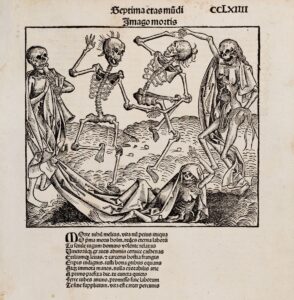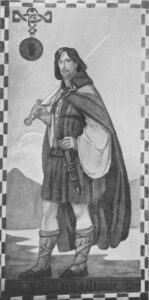BY AODHÁN CREALEY
MAY
17/1349

‘Seeing these many ills and how the whole world is, as it were, in an ill plight among the dead expecting death’s coming, I have set them down in writing, truthfully as I have heard them and tested them; and lest the writing should perish with the writer and the work fail with the worker, I leave parchment to carry on the work, if perchance any may survive or any of the race of Adam may be able to escape this pestilence and continue the work I have begun’
—last entry in the annals of Franciscan Friar John Clyn of Kilkenny.
The Black Death (bubonic plague) originated in Asia and killed over 25 million people or about a third of Europe’s population over a three-year period (1347–50). In Ireland it was first reported in Howth in August 1348, and then spread rapidly in the congested streets of Dublin and other English-held towns like Drogheda and Waterford. By the close of the century the population of Ireland had fallen by between a third and a half. The Irish annals made only brief references to it and, though the native Irish, living in the countryside, were less affected, the Annals of Ulster, in just one reference, mentioned its prevalence in the ancient kingdom of Moylurg in present-day County Roscommon. Indeed, the first recorded Black Death burial site in Ireland is thought to have been discovered just twenty years ago in Knockvicar in that county, where the skeletal remains of 45 men, women and children were discovered. Beneath a blot of ink under Friar Clyn’s final entry is written in another hand: ‘Here it seems the author died’.
02/1945
Taoiseach Éamon de Valera called at the German legation in Dublin to offer his condolences to Minister Edouard Hempel on the death of Adolf Hitler.
08/1945
V-E Day celebrated throughout the UK and in unionist areas of Northern Ireland. A number of Trinity College students hung Union Jacks around the university, leading to disorder in the surrounding streets.
10/1925
William Ferguson Massey (69), Limavady-born prime minister of New Zealand from 1912, the only premier in the world to retain office before, during and after the First World War, died.
16/1945
‘Could he not find in his heart the generosity to acknowledge that there is a small nation that stood alone, not for one year or two, but for several hundred years against aggression; that endured spoliations, famines, massacres, in endless succession …’—from Éamon de Valera’s radio broadcast in reply to Churchill’s victory speech three days earlier in which he emphasised how Britain ‘stood alone’ in the early stages of the conflict.
19/2015
On a four-day visit to Ireland the Prince of Wales, now King Charles III, during a reception in Galway met Gerry Adams, who was a senior member of the IRA when it murdered his great-uncle, Lord Mountbatten (1979).
23/1995
President Mary Robinson visited the Choctaw Nation in Oklahoma to thank them for their donation of $170 in 1847 towards relief during the Great Hunger. The ‘Kindred Spirits’ sculpture in Midleton, Co. Cork, commemorates the donation.
27/1975
William ‘Bob’ Collis (74), physician and author who was amongst the first group of physicians to treat survivors of Belsen concentration camp, died after a riding accident.
30/1975
The European Space Agency (ESA), an intergovernmental body devoted to space exploration, was founded.
JUNE
02/1567

Shane O’Neill (c. 37), ‘Shane the Proud’, chieftain, was murdered by the MacDonnells of Antrim. Declaring himself ‘The O’Neill’ in 1559, Shane—unlike his more celebrated successor Hugh O’Neill, who was reared as a loyal subject of the Crown—was the last of the truly Gaelic chieftains. He is best remembered, perhaps, for his visit to the court of Queen Elizabeth in 1562, where he appeared in traditional Irish dress—a saffron mantle ‘sweeping round and round’ him—and escorted by 50 gallowglasses in shirts of mail reaching beneath their knees and with battleaxes in their hands. To the astonishment of a packed court, he threw himself to the floor in submission to the queen and delivered a passionate speech in Irish. He was not, however, to be Anglicised. His ambition, in his view his birthright, was to become ruler of Ulster. In a series of raids on his neighbours, the O’Donnells, the Maguires and the O’Reillys, he left an estimated 4,500 dead and then defeated the MacDonnells at the Battle of Glenshesk, near Ballycastle. Whilst Lord Deputy Sidney’s invasion of the north, in 1566, failed to crush him, his luck ran out the following year. Crossing the River Swilly at Farsetmore near Letterkenny, he was heavily defeated by the O’Donnells and MacSweenys, losing 600 men in battle and a further 1,300 drowned whilst retreating across the Swilly, then swollen by a rising tide. Seeking refuge with the MacDonnells was perhaps an act of desperation, though he may have hoped to use hostage Sorley Boy MacDonnell as a bargaining chip. In any event he failed to impress them and he, along with his five companions, had their throats cut.
03/1975
Three Protestant men, one of whom served in the UDR, were shot dead by the IRA in their car just 150 yards north of the border near Newry, Co. Down. They were returning from a dog show in Cork.
07/1925
Matt Talbot (69), devout recovering alcoholic, collapsed and died on his way to work from his home in Rutland Street, Dublin.
09/1925
Sir Anthony MacDonnell (81), under-secretary (1902–8) who declined the offer of a seat in the Senate of the Irish Free State, died.
11/1925
‘We, against whom you have done this thing, are no petty people. We are one of the great stocks of Europe. We are the people of Burke; we are the people of Grattan; we are the people of Swift, the people of Emmet, the people of Parnell …’—W.B. Yeats in the debate on divorce in Seanad Éireann.
17/1775
The Battle of Bunker Hill, during the first stage of the American Revolutionary War, resulted in a narrow British victory.
20/1925
Edward O’Brien, yachtsman and author, sailed into Dún Laoghaire harbour in his ketch Saoirse at precisely 4.30pm having circumnavigated the globe. He had departed from there two years earlier at exactly the same date and time.
20/1985
George Gilmore (87), republican socialist, co-founder of the Republican Congress (1934) with Frank Ryan and Peadar O’Donnell, died.
22/1925
Matthew Gibney (89), County Cavan-born bishop of Perth (1886–1910), best known for administering the last rites to the bushranger Ned Kelly following a shoot-out in Glenrowan, Victoria (1880), died.
23/1985
Air India Flight 182, en route from Montreal to New Delhi and Bombay via London, disintegrated some 90 miles off the Irish coast as a result of a bomb placed on board. All 329 passengers and crew lost their lives.
25/1945
Seán T. Ó Ceallaigh/O’Kelly, founder member of Fianna Fáil, was inaugurated as president of Ireland in succession to Douglas Hyde.
